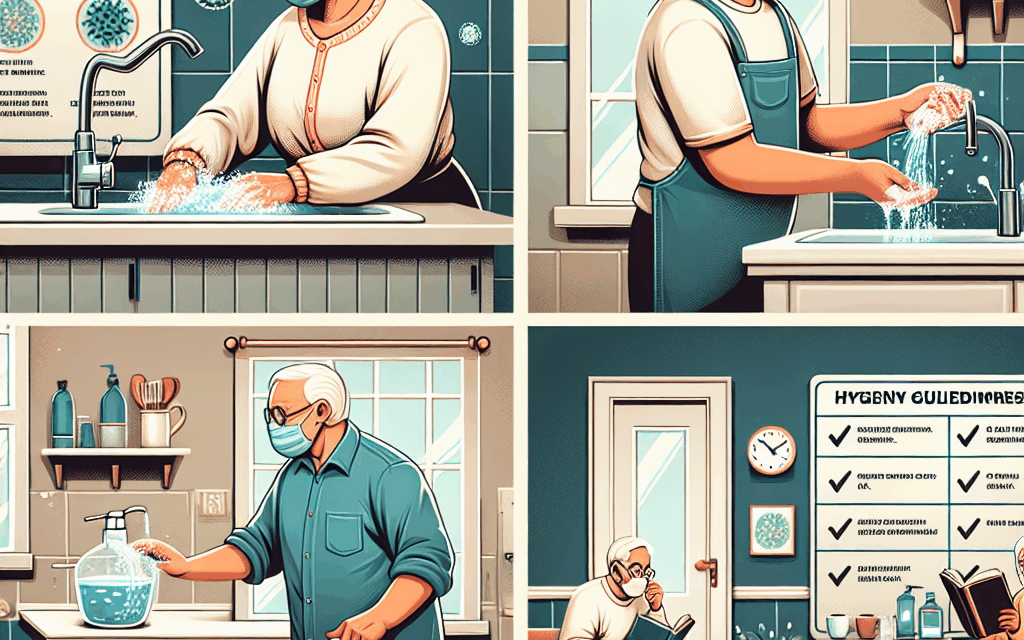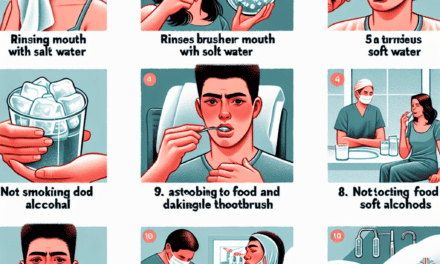Preventing Infections at Home: A Guide for Seniors
As we age, our immune systems naturally weaken, making seniors more susceptible to infections. This vulnerability can lead to serious health complications, especially for those with pre-existing conditions. However, many infections can be prevented with simple, proactive measures taken at home. This guide aims to provide seniors and their caregivers with comprehensive strategies to minimize the risk of infections, ensuring a healthier and safer living environment.
Understanding the Risks: Common Infections Among Seniors
Before diving into prevention strategies, it’s essential to understand the types of infections that commonly affect seniors. These infections can range from mild to severe and can significantly impact quality of life.
- Respiratory Infections: Pneumonia and influenza are prevalent among older adults. The Centers for Disease Control and Prevention (CDC) reports that adults aged 65 and older are at a higher risk for complications from these infections.
- Urinary Tract Infections (UTIs): UTIs are common in seniors, particularly women. Symptoms can be subtle, making them easy to overlook, yet they can lead to serious health issues if untreated.
- Skin Infections: Seniors often experience skin changes that can lead to infections. Conditions like pressure ulcers or cellulitis can arise from prolonged immobility or poor circulation.
- Gastrointestinal Infections: Foodborne illnesses can be particularly dangerous for seniors. The risk of infections like norovirus or salmonella increases with age due to weakened immune responses.
- Sepsis: This life-threatening condition can arise from infections anywhere in the body. Seniors are at a higher risk due to underlying health issues and a diminished immune response.
Understanding these risks is the first step in implementing effective prevention strategies. By recognizing the types of infections that pose a threat, seniors and caregivers can take targeted actions to mitigate these risks.
Creating a Clean and Safe Home Environment
A clean home is the first line of defense against infections. Regular cleaning and sanitization can significantly reduce the presence of pathogens that cause illness. Here are some key strategies for maintaining a clean environment:
1. Regular Cleaning Routines
Establishing a regular cleaning schedule is crucial. Focus on high-touch surfaces that are often overlooked, such as:
- Doorknobs and handles
- Light switches
- Remote controls
- Countertops and tables
- Bathroom fixtures
Using disinfectants that are effective against a broad spectrum of pathogens is essential. The Environmental Protection Agency (EPA) provides a list of approved disinfectants that can be used safely in homes. It’s important to follow the manufacturer’s instructions for proper use and contact time to ensure effectiveness.
2. Decluttering and Organizing
A cluttered home can harbor dust, allergens, and germs. Regularly decluttering not only makes cleaning easier but also reduces the risk of falls, which can lead to injuries and subsequent infections. Consider the following tips:
- Sort through belongings regularly and donate or discard items that are no longer needed.
- Organize frequently used items in easily accessible locations to minimize the risk of accidents.
- Keep floors clear of obstacles to prevent falls.
3. Proper Waste Disposal
Improper waste disposal can lead to the growth of bacteria and pests. Ensure that:
- Trash is disposed of regularly and containers are cleaned frequently.
- Food waste is sealed and stored properly to prevent attracting pests.
- Recycling is done according to local guidelines to minimize contamination.
4. Ventilation and Air Quality
Good air quality is vital for preventing respiratory infections. Ensure that your home is well-ventilated by:
- Opening windows when weather permits to allow fresh air circulation.
- Using air purifiers with HEPA filters to reduce airborne pathogens.
- Regularly changing HVAC filters to maintain optimal air quality.
5. Safe Food Handling Practices
Foodborne illnesses can be particularly dangerous for seniors. Implementing safe food handling practices is essential:
- Wash hands thoroughly before and after handling food.
- Cook foods to the appropriate temperatures to kill harmful bacteria.
- Store leftovers promptly and reheat them to safe temperatures before consumption.
By creating a clean and safe home environment, seniors can significantly reduce their risk of infections. Regular cleaning, proper waste disposal, and safe food handling are foundational practices that contribute to overall health and well-being.
Personal Hygiene: A Key Component of Infection Prevention
Personal hygiene plays a critical role in preventing infections. Seniors should prioritize hygiene practices to protect themselves from various pathogens. Here are some essential hygiene practices:
1. Hand Hygiene
Handwashing is one of the most effective ways to prevent the spread of infections. Seniors should wash their hands frequently, especially:
- Before eating or preparing food
- After using the restroom
- After coughing, sneezing, or blowing their nose
- After touching animals or handling pet food
When soap and water are not available, hand sanitizers containing at least 60% alcohol can be used as an alternative. However, it’s important to note that hand sanitizers are not as effective when hands are visibly dirty or greasy.
2. Oral Hygiene
Maintaining good oral hygiene is crucial for preventing infections, particularly in the mouth and throat. Seniors should:
- Brush teeth at least twice a day and floss daily.
- Visit the dentist regularly for check-ups and cleanings.
- Use mouthwash to help reduce bacteria in the mouth.
Poor oral hygiene can lead to gum disease, which has been linked to systemic infections and other health issues.
3. Bathing and Skin Care
Regular bathing helps remove dirt, sweat, and bacteria from the skin. Seniors should consider the following:
- Bathtime routines should be established, ensuring that seniors bathe at least twice a week or as needed.
- Moisturizing the skin can help prevent dryness and cracking, which can lead to infections.
- Pay special attention to areas prone to skin breakdown, such as underarms, groin, and between toes.
4. Nail Care
Keeping nails trimmed and clean is essential for preventing infections. Seniors should:
- Trim nails regularly to prevent hangnails and ingrown nails.
- Keep nails clean and free from dirt.
- Avoid biting nails or picking at cuticles, as this can introduce bacteria.
5. Managing Incontinence
Incontinence can increase the risk of urinary tract infections. Seniors should manage incontinence by:
- Using absorbent products designed for incontinence.
- Changing products frequently to maintain skin integrity.
- Practicing good hygiene after each change to prevent bacterial growth.
By prioritizing personal hygiene, seniors can significantly reduce their risk of infections. Simple practices like handwashing, oral care, and regular bathing can make a substantial difference in overall health.
Vaccinations: A Crucial Defense Against Infections
Vaccinations are a vital component of infection prevention, especially for seniors. As the immune system weakens with age, vaccines can provide essential protection against various diseases. Here are key vaccinations that seniors should consider:
1. Influenza Vaccine
The flu can be particularly severe for older adults, leading to hospitalization and even death. The CDC recommends that seniors receive the flu vaccine annually. Studies show that vaccination can reduce the risk of flu-related complications by up to 60% in older adults.
2. Pneumococcal Vaccine
Pneumonia is a leading cause of morbidity and mortality among seniors. The pneumococcal vaccine protects against pneumonia and other serious infections caused by Streptococcus pneumoniae. Seniors should discuss with their healthcare provider about receiving both the PCV13 and PPSV23 vaccines, as recommended.
3. Shingles Vaccine
Shingles is a painful rash caused by the reactivation of the chickenpox virus. The CDC recommends that adults aged 50 and older receive the shingles vaccine to reduce the risk of developing shingles and its complications, such as postherpetic neuralgia.
4. Tetanus, Diphtheria, and Pertussis (Tdap) Vaccine
The Tdap vaccine protects against tetanus, diphtheria, and pertussis (whooping cough). Seniors should receive a Tdap booster every ten years to maintain immunity, especially since pertussis can be particularly severe in older adults.
5. COVID-19 Vaccine
The COVID-19 pandemic has highlighted the importance of vaccinations for protecting vulnerable populations. Seniors are at a higher risk for severe illness from COVID-19, making vaccination crucial. Staying up-to-date with COVID-19 vaccinations, including boosters, is essential for ongoing protection.
Vaccinations are a proactive measure that can significantly reduce the risk of infections among seniors. Regular consultations with healthcare providers can help ensure that seniors receive the necessary vaccines based on their health status and age.
Promoting Healthy Lifestyle Choices
A healthy lifestyle can bolster the immune system and reduce the risk of infections. Seniors should focus on the following lifestyle choices:
1. Nutrition
A balanced diet rich in vitamins and minerals is essential for maintaining a strong immune system. Seniors should aim to include:
- Fruits and vegetables high in antioxidants, such as berries, spinach, and carrots.
- Lean proteins, including fish, poultry, beans, and nuts.
- Whole grains for fiber and energy.
Hydration is also crucial. Seniors should drink plenty of fluids throughout the day to stay hydrated, as dehydration can weaken the immune system.
2. Physical Activity
Regular physical activity can enhance immune function and overall health. Seniors should engage in at least 150 minutes of moderate-intensity aerobic activity each week, along with strength training exercises at least twice a week. Activities can include:
- Walking or jogging
- Swimming or water aerobics
- Yoga or tai chi for flexibility and balance
3. Sleep Hygiene
Quality sleep is vital for a healthy immune system. Seniors should aim for 7-9 hours of sleep each night. To promote better sleep, consider the following tips:
- Establish a regular sleep schedule by going to bed and waking up at the same time each day.
- Create a relaxing bedtime routine to signal to the body that it’s time to wind down.
- Avoid caffeine and electronic devices before bedtime.
4. Stress Management
Chronic stress can weaken the immune system, making individuals more susceptible to infections. Seniors should practice stress management techniques such as:
- Meditation or mindfulness exercises
- Deep breathing exercises
- Engaging in hobbies or activities that bring joy
5. Social Connections
Maintaining social connections is essential for mental and emotional well-being. Isolation can lead to increased stress and a weakened immune response. Seniors should:
- Stay connected with family and friends through phone calls or video chats.
- Participate in community activities or groups that align with their interests.
- Consider volunteering or mentoring to foster a sense of purpose.
By promoting healthy lifestyle choices, seniors can enhance their immune function and reduce the risk of infections. Nutrition, physical activity, sleep hygiene, stress management, and social connections all play a vital role in overall health.
Conclusion: Empowering Seniors to Prevent Infections
Preventing infections at home is a multifaceted approach that involves creating a clean environment, practicing good personal hygiene, staying up-to-date with vaccinations, and promoting healthy lifestyle choices. By understanding the risks associated with infections and implementing these strategies, seniors can significantly reduce their vulnerability to illness.
Key takeaways from this guide include:
- Regular cleaning and sanitization of the home environment are essential for infection prevention.
- Personal hygiene practices, including handwashing and oral care, play a critical role in reducing infection risk.
- Vaccinations are a vital defense against common infections that disproportionately affect seniors.
- A healthy lifestyle, including proper nutrition, physical activity, and stress management, can bolster the immune system.
- Social connections are important for mental health and can indirectly support physical health.
By taking proactive steps, seniors can empower themselves to live healthier, safer lives, minimizing the risk of infections and enhancing their overall well-being.





